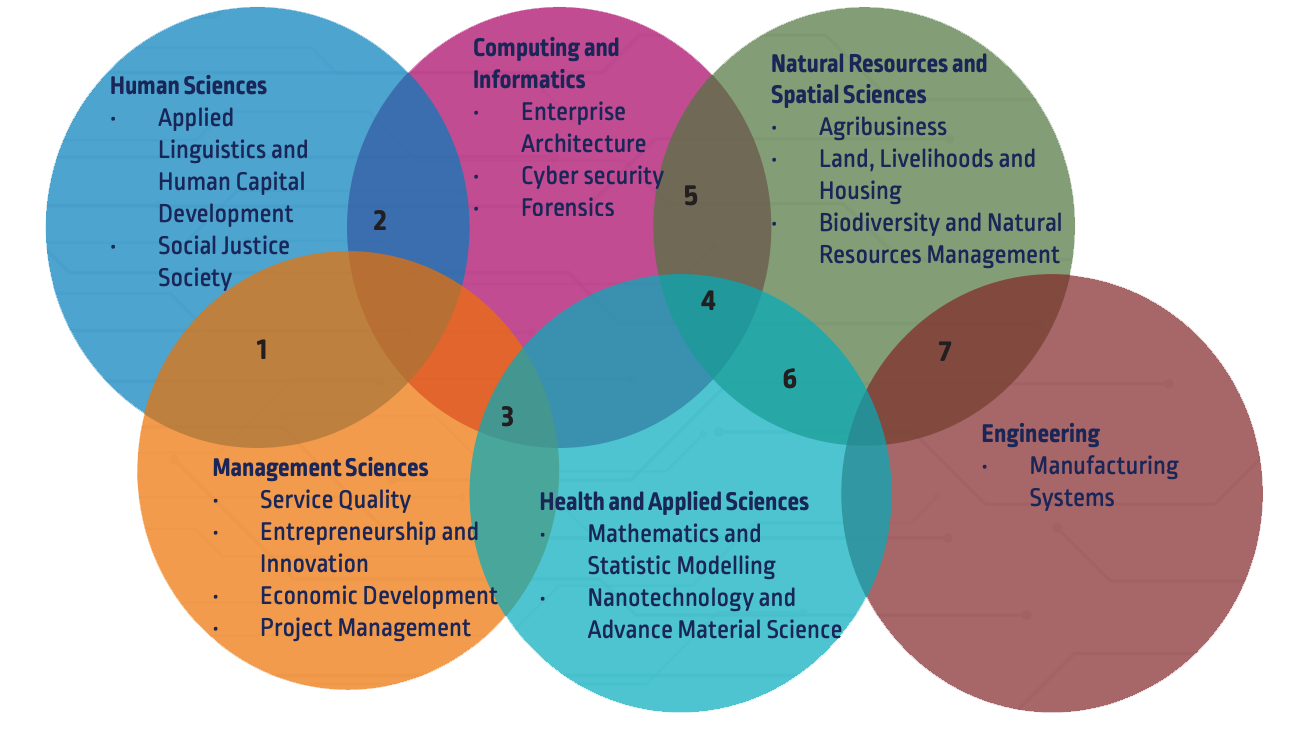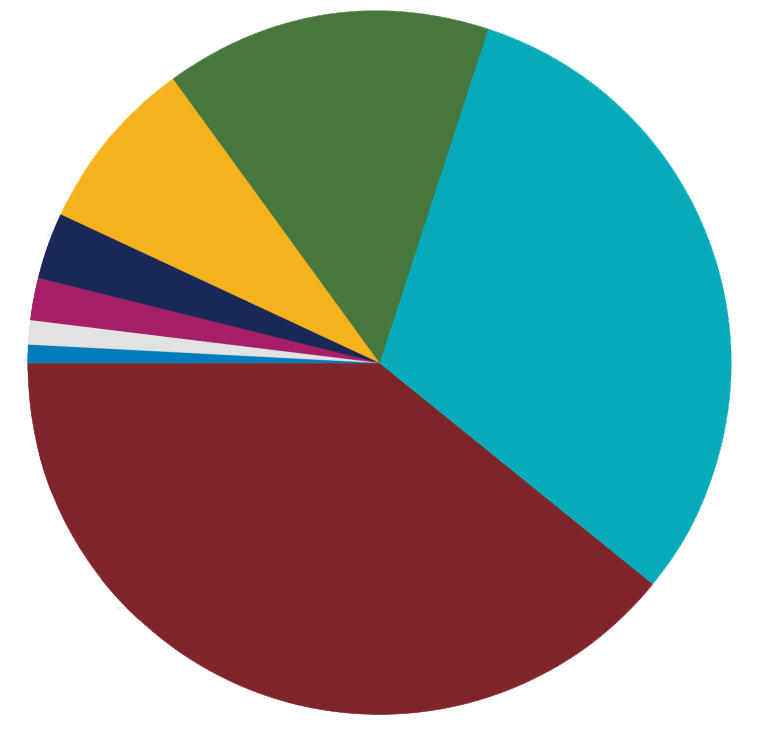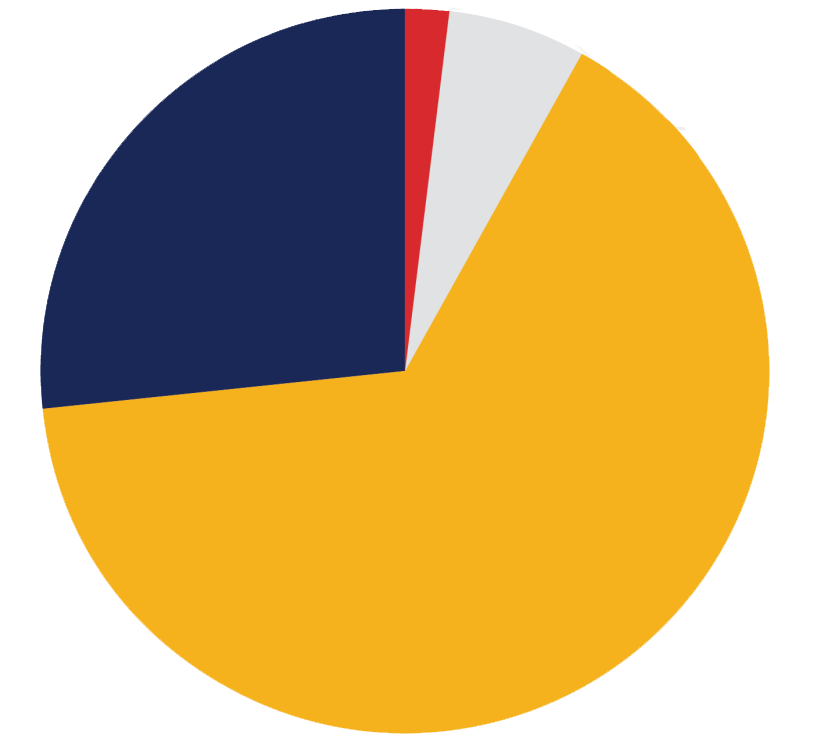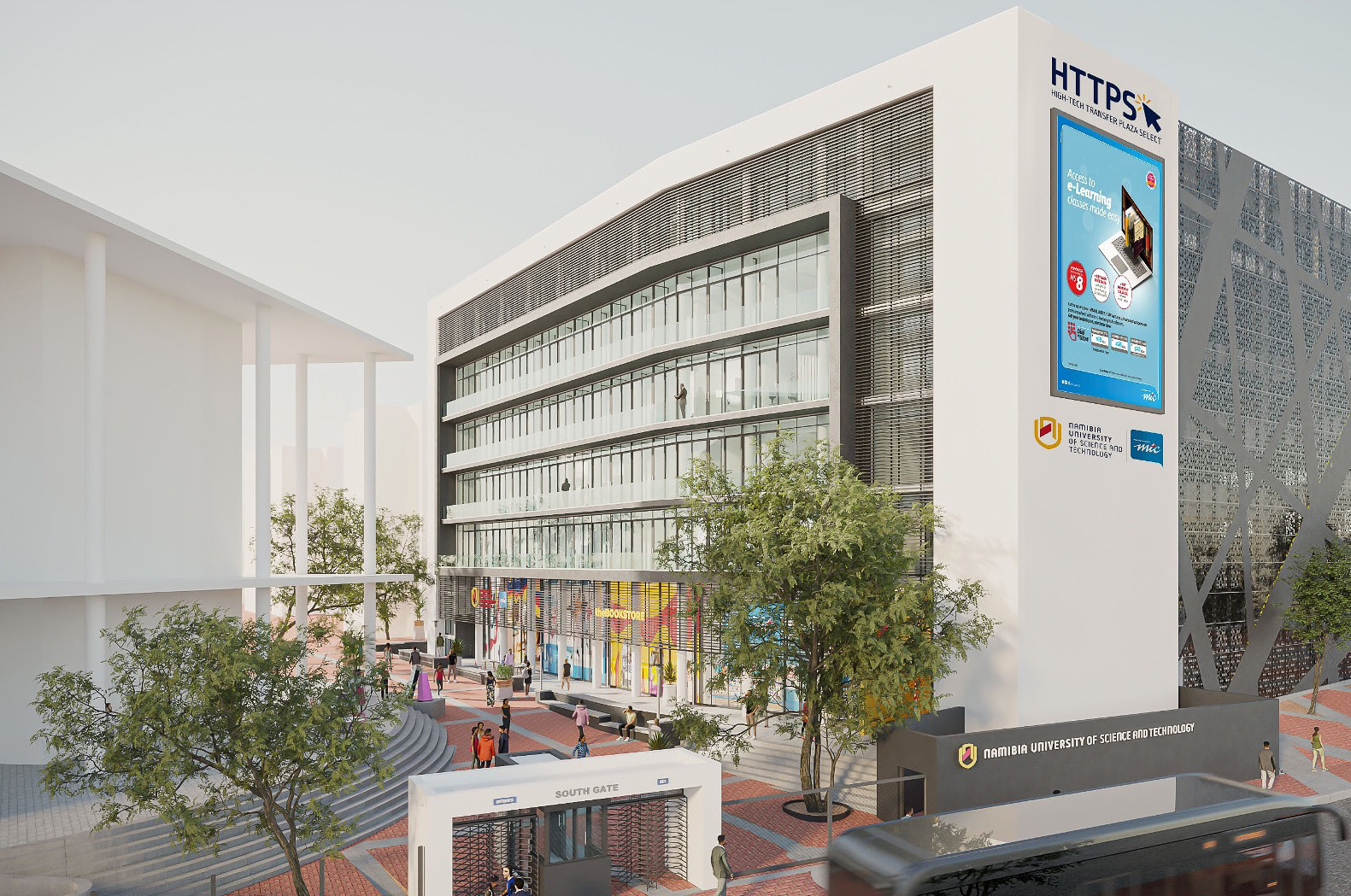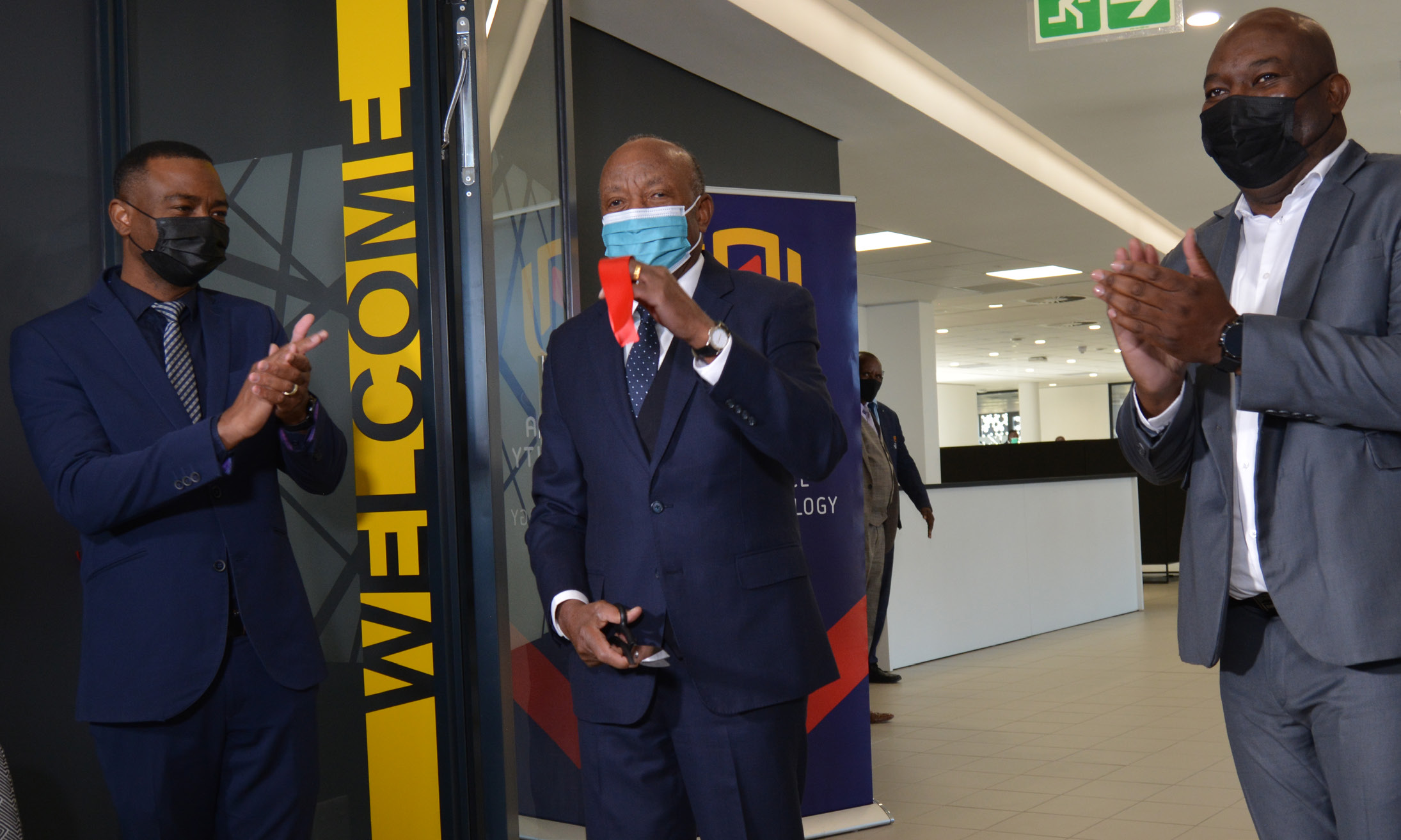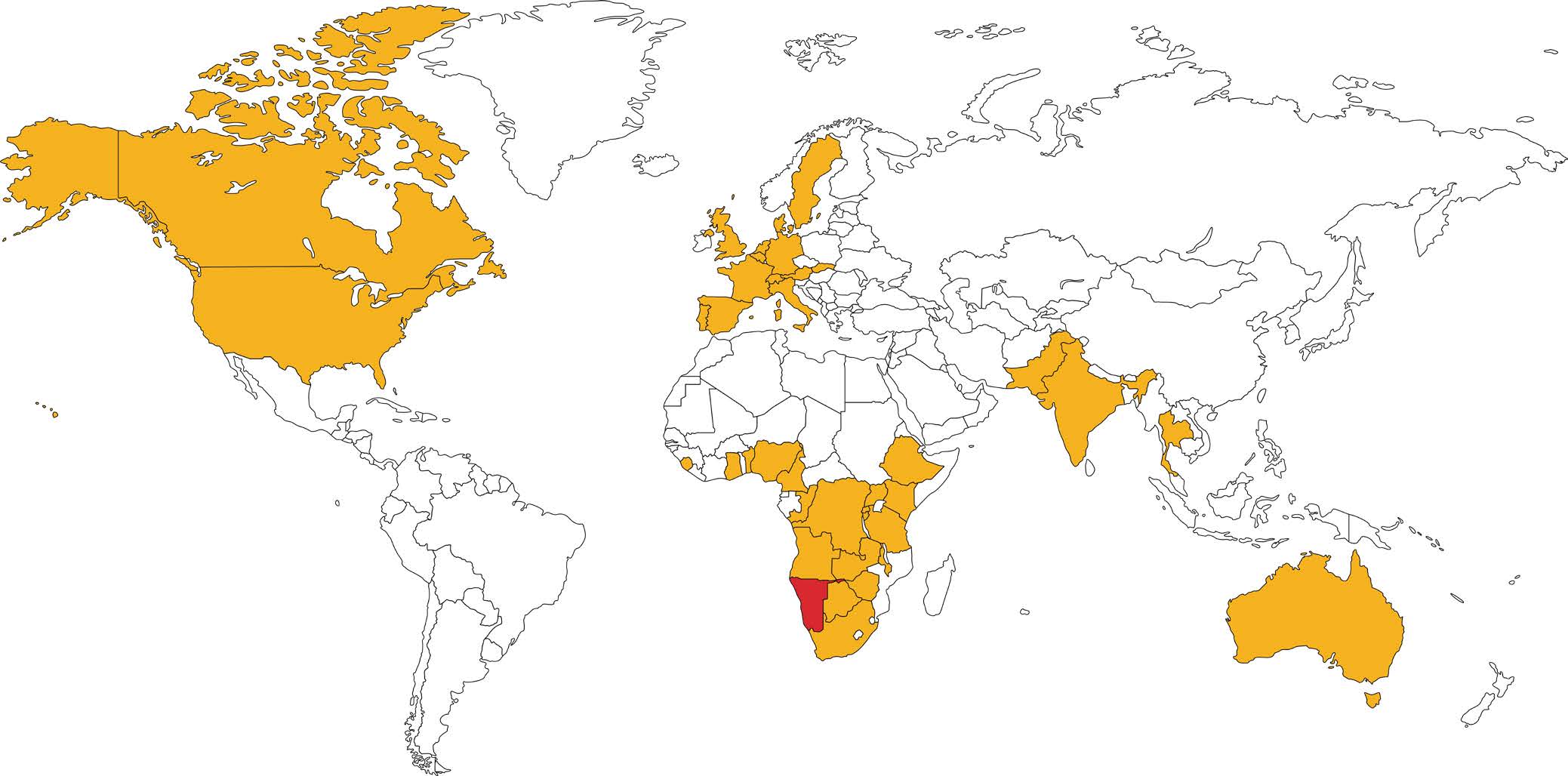Research Report - Research Matters 2021
It gives me great pleasure to introduce the Namibia University of Science and Technology (NUST) 2021 Research Report. This publication comes at a time when the Institution recently launched the revised Strategic Plan 2021-2025, in which research is outlined in one of the key goals, specifically aiming to become an institution that leads innovation, partnerships and entrepreneurship. This can be achieved by, amongst others, promoting strategic and sustainable partnerships for local, regional, and global impact.
By our mandate as a technological university, NUST is at the forefront of leading the national agenda on the Fourth Industrial Revolution (4IR) and Society 5.0 – and we shall diligently respond and comply to becoming a premier technological university. Despite the financial constraints, we should all continue striving towards engaging in robust fundraising initiatives to tap into various income streams that offset budget reductions and invest in service improvement. This will contribute to teaching and research excellence, and the overall well-being of the University community.
Dr Erold Naomab
Vice-Chancellor
As we reflect on the past year, which has been marked by a number of setbacks, it has also certainly been more encouraging in comparison to the 2019/2020 period when the novel Coronavirus pandemic began. At one point, our research activities had nearly come to a complete halt, mirroring similar occurrences across the globe. However, as we gradually learn to live in this ‘new normal’, it is pleasing to note that our output is on a gradual upward trajectory. This Report thus offers a synopsis of the research landscape at the University in the 2021 academic year.
I would also like to take this opportunity to express my profound gratitude to my predecessor, Prof Pramanathan Govender, for his contribution to the Research Office during his tenure. In the same vein, I would also like to acknowledge and thank all the staff and students that made this publication possible.
Dr Colin Stanley
Acting Deputy Vice-Chancellor: Research, Innovation and Partnerships
2021 Research Outputs
|
FACULTY |
PEER REVIEWED JOURNAL ARTICLES |
BOOKS |
BOOK CHAPTER |
ORAL/POSTER CONFERENCE PRESENTATIONS |
TECHNICAL REPORTS |
OTHER |
TOTAL |
|
Computing and Informatics |
- |
5 |
7 |
52 |
- |
4 |
68 |
|
Engineering |
32 |
- |
10 |
16 |
7 |
1 |
66 |
|
Health and Applied Sciences |
24 |
3 |
8 |
5 |
- |
- |
40 |
|
Human Sciences |
12 |
13 |
21 |
8 |
26 |
- |
80 |
|
Management Sciences |
35 |
1 |
18 |
12 |
2 |
18 |
86 |
|
Natural Resources and Spatial Sciences |
32 |
1 |
12 |
18 |
2 |
9 |
74 |
|
Total |
135 |
23 |
76 |
111 |
37 |
32 |
414 |
2021 Postgraduate Students
| FACULTY | Students |
| Computing and Informatics | 190 |
| Engineering | 113 |
| Health and Applied Sciences | 137 |
| Human Sciences | 308 |
| Management Sciences | 642 |
| Natural Resources and Spatial Sciences | 195 |
| Total | 1585 |
1: Public Private Partnerships and Economic Development
2: Information Communication Technology for Development; Indigenous Knowledge Systems
3: Health Informatics
4: Indigineous Knowledge and Medicinal Plants
5: Geo-Spatial Tools
6: Environmental and Human Health
7: Mining and Sustainability and Environmental Impact
The Project Services Unit (PSU), plays an important role in providing strategic direction in fostering cooperation across all Faculties, Institutes and Centres, aimed at optimising effectiveness, catalysing and adding value to existing research endeavours. Thus identifying opportunities to leverage research grants in support of local and international development activities. As such, the Unit facilitates project design, and the development and management of research grants. In this regard, an inter-disciplinary and multi-sectoral (beyond borders) approach, that recognises the future long-term research needs to maximise impact is emphasised.
Moreover, the rise of a global knowledge economy has increased the need for internationalisation and strategic partnerships that go beyond the traditional funding of discrete research projects. When companies, development partners and universities work in tandem to push the frontiers of knowledge, they become a powerful engine for innovation and economic growth. This results in strategic partnerships merging the discovery-driven culture of the university with the innovation-driven environment of the industry, and working together to have an impact.
Grant Funding across the University’s Entities
Faculty of Engineeing: 39%
Faculty of Health and Applied Sciences: 31%
Faculty of Natural Resources and Spatial Sciences: 15%
Project Services Unit: 8%
Namibia Business Innovation Institute (NBII): 3%
Faculty of Computing and Informatics: 2%
Quality Assurance Unit: 1%
Faculty of Human Sciences: 1%
Grant Funding Proportional to NUST Research Areas
Sustainability: 65.22%
Technology: 26.46%
Energy: 6.2%
Indigenous Knowledge: 2.12%

NUST, in collaboration with the Technical University of Munich (TUM) in Germany, set up a solar power plant on Farm !Kharoxas, which is located approximately seven kilometres south of Groot Aub in the Khomas Region. The solar power plant forms part of the living laboratory concept adopted by TUM’s Sustainable Energy and Entrepreneurship Development (SEED) Centre, in collaboration with eight partner institutions. The purpose of the project, funded by the German Academic Exchange (DAAD), is to provide practical training to postgraduate students in the solar energy field.
The Lab’s 20 kilowatts peak solar power was designed and specified by the Department of Electrical and Computer Engineering (DECE) in the Faculty of Engineering at NUST and constructed by the Namibian Engineering Corporation (NEC).
PROCEED is a German-Namibian joint project examining options for an efficient, sustainable and renewable energy-based power supply in Namibia via mini-grids. The goal of PROCEED is to better the lives of populations in remote areas that do not have access to a reliable energy infrastructure.
An analysis of these off-grid hybrid energy systems will identify models for the use of renewable energies that fit the local needs and societal context and which are also technically up-to-date, economically viable, easy to maintain, and therefore sustainable.
In 2018, NUST won the European Union funded P3ICL project to study the status of indigenous languages in Namibia. The project’s technical advisory committee consisted of NUST researchers; the Ministry of Education, Arts and Culture; the Museums Association of Namibia; the Namibia Scientific Society; the United Nations Educational, Scientific and Cultural Organisation (UNESCO); Namibia Media Holdings; and the Mother Languages Association.
The project required researchers to travel and engage with remote communities in Ruacana, Tsumkwe, Aminius, Opuwo and Aranos, for data collection. During the three years of research, the P3ICL team collected stories, folk tales, and proverbs. They summarised this knowledge into six books that are now part of the NUST Library repository. In terms of indigenous language survival, the team found that Oshiwambo, Otjiherero and Namibian Khoe Khoe cultures and languages faced a serious threat of endangerment.
The P3ICL research project concluded with a seminar at which the findings were presented and the six books were launched. The EU availed N$3.9 million for this project.
The project aimed to strengthen cross-border ecosystem management and wildlife protection through co-designing and implementing conservation monitoring technology with the park authorities and surrounding communities. The project expanded on the Namibian experiences with community involvement in ecotourism and conservation. Namibia has been at the forefront of devolving natural resource management authority to the local communities through the legally mandated Community-based Natural Resource Management (CBNRM) programme.
The multiple studies contributed to the Integrated Ecosystem Management Framework for the Transfrontier Park. This Framework aims to provide context for management decision-making through highlighting the scientific perspective and clarifying the connections of the ecological aspects to management. The project was funded by the European Union to the value of N$16 million.

 |
|
As a responsive University, community engagement is prioritised at NUST as a means of imparting new knowledge, renewal of curricula and the development of skills identified in the nation’s development plans.
Key highlights:
The International Conference on Data Science, Machine Learning and Artificial Intelligence (DSMLAI) 2021 received 75 submissions from more than eight different countries from all over the world, reviewed by a double-blind process. Forty-eight submissions (overall, 64% acceptance rate) were accepted for presentation at the Conference.
The African Research Symposium programme included invited talks and oral contributions from African researchers. The four-day conference technical sponsors were the Institute of Electrical and Electronics Engineers (IEEE) Computer Society; the IEEE Technical Committee on Data Engineering; DARA Big Data; and the Namibia-India Center of IT (INCEIT).
The International Multi-disciplinary Information Technology and Engineering Conference (IMITEC), attracted 83 papers and researchers from Namibia, Botswana, South Africa, Zimbabwe and Burkina Faso. The three-day IMITEC was sponsored (technical) by the IEEE Computer Society and the IEEE Technical Committee on Data Engineering.
The 2021 Tech Bazaar event was hosted virtually on Zoom. About 154 innovators registered and 55 innovative ideas were selected, where 40 innovators presented their ideas. The innovators were placed in five significant sessions namely: Agriculture and Internet of Things (IoT), Health, Finance and E-commerce, Communications and Media, and Education.
The Smart Energy Solutions for Africa (SESA) Project was granted funding under the Horizon 2020 grants. SESA is a collaborative four-year project of a 29 member consortium with partners from Europe and Africa, including NUST. It is funded by the European Union to the tune of approximately N$170 million.
The “Biomass Utilisation by Sustainable Harvest” (BUSH) project was funded for approximately N$3.7 million, by GIZ. It encouraged and promoted research on the commercial use of biomass through controlled bush thinning practices. Through technology dissemination and value chain development, Namibia can have a conducive environment for bush control and a growing bio-economy. The project, which was recently concluded, has provided opportunities for the nation to promote the generation and application of knowledge related to the biomass industry and has set the platform, from which NUST can expand its research and development efforts towards an internationally recognised research centre/institute. It has led to several additional successful grant applications to continue the research work within the biomass industry.
The Southern African Solar Thermal Training and Demonstration Initiative (SOLTRAIN) initiative started in 2009, and is now in its fourth phase of cooperation with Botswana, Lesotho, Mozambique, Namibia, South Africa, Zimbabwe, and the SADC Centre for Renewable Energy and Energy Efficiency (SACREEE). It aims to support the target countries in transitioning from a largely fossil energy based supply system to a sustainable energy based on renewable energy in general, and on solar thermal in particular. One hundred and two solar water heaters demonstration systems were co-financed, installed and inspected for quality check under the SOLTRAIN project. SOLTRAIN is a regional initiative on capacity building and demonstration of solar thermal systems in the SADC region. The Austrian Development Agency (ADA), through AEE INTEC Institute Sustainable Technologies, funds the project.
In this project, the aim is to develop low-cost bioinoculant biotechnology, which will contribute to the development of sustainable options that shape local food production leading to a balanced diet. This will contribute to reduction of hunger and malnutrition, social and economic burdens.
Modern plant biotechnology holds the potential for more sustainable agricultural practices that are required to feed the growing world population with a lower impact on the changing environment. However, their adoption in many countries has been characterised by public discourse due to perceived risks and safety. To improve the understanding of modern biotechnologies, stakeholders need to be accurately educated about the technology for them to fully participate in decision making processes. This project is funded by the University of Ghent (Belgium).
Overview of Engagement
- High impact public engagement activities interfacing between science and society in the context of modern plant biotechnologies were successfully concluded with different stakeholders nationwide.
- A total of four schools: Amazing Kids; Centaurus Secondary School; Okahandja Secondary School; and Rehoboth High School were engaged face-to-face.
- A workshop on modern biotechnology was also organised for the farmers in Windhoek.
Remote areas in Namibia have several structural barriers such as geography, road quality, distance and travel costs that prevent people from accessing medical assistance. Hence, people in these areas often reach the nearest medical facility when it is too late or they do not consult doctors at all. This is especially critical in emergencies such as snake bites or acute coronary syndromes.
The objective of this umbrella project by the University is to improve the health care delivery in Namibia via E-Health. One vision is to establish M-governance to allow people to obtain medical advice and order medical supplies via their phones (“In case of a snake bite, please press 1…”). In a second step, required pharmaceuticals and medical sundries shall be supplied directly to the patient, switching to a patient-centric approach. The delivery system of the required pharmaceutical and medical sundries will be substantiated by healthcare support teams based in each district and the doctor on call.
In this sub-project, the focus is on the distribution supply chain, using drones and motorbikes for transportation. The objective is to develop an optimisation tool prototype considering business constraints and cost to conduct a feasibility study. The M-governance system will remain indispensable in the scope of this sub-project.
This is inter-disciplinary and multi-disciplinary research is conducted and driven by researchers in the Faculties of Management Sciences; Health and Applied Sciences; Natural Resources and Spatial Sciences; the Teaching and Learning Unit (TLU); and the Namibian German Centre for Logistics. Furthermore, there was engagement with the Ministry of Health and Social Services in Namibia and a team from Germany, since 2017, when the concept was first mooted.
In response to the COVID-19 pandemic, the Minister of Higher Education Technology and Innovation, Honourable Dr Itah Kandjii-Murangi, launched a High-Level Inter-institutional Research Task Force on COVID-19. The team functioned as the high education sectorial response to the pandemic. It has members from NUST, the University of Namibia (UNAM), the National Commission on Research Science and Technology (NCRST), and the private sector. Several thematic areas were identified with different projects and teams. Some of the achievements, to date, include the development of:
- a COVID-19 essential information-sharing website;
- a Rapid Socio-economic and Vulnerability Assessment, funded by UNDP;
- COVID-19 publications (4 books chapters);
- Several prototype products supporting the government against the pandemic;
- and field trips were conducted nationwide to collect Marama bean seed and Moringa leaves for processing.
A number of the products were produced with the latest 3D printing technology at Fabrication Laboratory (Fablab), donated by the Ministry of Industrialisation, Trade and Small and Medium-sized Enterprises.
3D Printed Oxygen Delivery T-Connectors
Through a tripartite consortium between the Ministry of Health and Social Services, NUST, and UNAM, a 3D Oxygen Delivery T-Connector Project, sponsored by FirstRand Namibia, was established. The T-Connector is a t-shaped innovative device that connects different medical equipment such as Continuous Positive Airway Pressure (CPAP) oxygen supply components.
NUST’s Fabrication Laboratory (Fablab), printed the devices using state of the art three-dimensional (3D) printers and laser-cutting engraving technologies.
The Lab fosters innovation through knowledge and skills transfer in digital technologies, advanced manufacturing, design thinking and industry 4.0 applications.
The printing is done using a medical-grade resin that has passed the cytotoxicity testing. Hochschule RheinMein, Germany, generously donated the medical-grade resin used to produce these components and more than 100 parts have been produced. NUST continues to play an active role in responding to industry needs during, and beyond the pandemic.



| Faculty | Type of Publication | Title |
| Faculty of Management Sciences | Books |
Handbook of Research on Strategies and Interventions to Mitigate COVID-19 Impact on SMEs (2 Volumes) by Neeta Baporikar Handbook of Research on Sustaining SMEs and Entrepreneurial Innovation in the Post-COVID-19 Era by Neeta Baporikar |
| Centre for Open and Lifelong Learning; and the Quality Assurance Unit | Book |
The Impact of Remote Instruction on Higher Education in Namibia during COVID-19 Chapter by Wynand Diergaardt; Jacqueline Bock and Anneley Willemse |
| Faculty of Human Sciences | Book |
Global Capital's 21st Century Repositioning - Between Covid-19 and Fourth Industrial Revolution on Africa. Langaa Publishers by Rewai Makamani; Artwell Nhemachena and Oliver Mtapuri |
| Faculty of Natural Resources and Spatial Sciences | Report (Consultancy funded by GIZ) |
National Alliance for Informal Settlement Upgrading: COVID-19 Support Unit. A project to address COVID-19-related emergency measures in informal settlements by Guillermo Delgado |
| Faculty of Computing and Informatics | Journal Articles |
The (Potential) Role of Technology for Young Children’s Social-Emotional Learning: During and Beyond the COVID-19 Pandemic. Digital Government: Research and Practice by Naska Goagoses, Heike Winschiers-Theophilus, and Michael Chamunorwa Playing on the Globe: Facilitating virtual communications between Namibian and Finnish learners to co-design an interactive map game. In Interaction Design and Children by Erkki Rötkönen, Heike Winschiers-Theophilus, Naska Goagoses, Helvi Itenge, Gabriel Shinedima, and Erkki Sutinen |
Additionally, a national book project titled ‘COVID-19: A GLOBAL PANDEMIC, A NAMIBIAN PERSPECTIVE’ was launched. Several NUST staff members made contributions towards the publication, which was edited by K.C. Chinsembu, A. Cheikhyoussef, H. Kwaambwa, T. Kalusopa and D. Mumbengegwi.
The Institutional Research Week (IRW) brought together eminent scholars, researchers, policy-makers, and various stakeholders, thus constituting an innovative hub to showcase novel ideas in interdisciplinary and multi-disciplinary research. This time, the event was hosted by the Faculty of Management Sciences under the theme: “Living in a World of Pandemics”.
The IRW adopted a virtual format which saw participants presenting their research articles to an online audience. The conference aims at uncovering research, explore and deduce inferences, outcomes, facts, and ideas on the ‘new normal’ brought upon by the COVID-19 pandemic. The idea was to explore and reshape the world of pandemics beyond the new normal into a better world through knowledge integration of all forms of academic disciplines.
Prof Salim Safurdeen Abdool Karim, the Vice President of the International Science Council and an infectious diseases specialist, delivered the keynote address. His topic centred on Living in a World of Pandemics Secure Environment, Public Health vs. Livelihoods: Lessons and Way Forward.
As a forward-thinking Institution that continuously thrives to be at the forefront of technology advancements, the NUST Tech Day was held on 31 May 2021. The event gave faculties and external stakeholders the opportunity to showcase their innovative tech projects and services.
The Day exemplifies NUST as the only technological university in the country, hence the focus is on tech-orientated research outputs and their contribution to the NUST Strategic Plan.
The Faculty of Computing and Informatics walked away with the Tech Gamer Award for entertaining the most staff and students at their stand, by offering a variety of tech-savvy games. The event will, henceforth, be an annual celebration, recognising the skill and potential of achieving excellence in research and innovation.
His Excellency Dr Hage Geingob, the President of the Republic of Namibia, appointed a Task Force responsible for harnessing the opportunities presented by the Fourth Industrial Revolution (4IR).
NUST forms part of the eight-member team, which comprises of representatives from the private and public sectors, civil society, government representatives and agencies. The Force’s mandate is to gauge Namibia’s readiness for the 4IR in addition to making recommendations for policy and legal framework in this regard.
The main focus of the BRC is to conduct applied research which supports decision-making regarding the conservation and sustainable use of biodiversity resources. Some of the key areas of research undertaken by centre staff and postgraduate students are on human-wildlife conflict including elephants, snakes and vultures.
During the year, amongst others, the Centre engaged communal and commercial farmers in Kunene to study the causes of conflict with elephants. The Ministry of Environment Forestry and Tourism and the Centre monitor satellite collared elephants in order to determine possible causes for elephants frequenting farmland. Two Masters students are due to complete their studies in this field.
Prof Morgan Hauptfleisch - Associate Professor: Nature Conservation
mhauptfleisch@nust.na
NIST’s core objective is the promotion of aerospace amongst various stakeholders for the sole purpose of capacity building and imprinting Namibia’s footprint on the global space scene.
Dr Smita Francis - Coordinator
sfrancis@nust.na
INCEIT focuses on offering training in specialised areas of Information Technology. The government of India initiated a proposal for the setting up of INCEIT to have international outreach for imparting ICT education and enhancing research initiatives in Namibia.
Mr Arpit Jain – Centre Head
ajain@nust.na
The NBII is a national leader in research, entrepreneurship and innovation. It aids the growth of entrepreneurs from ideas to the marketplace by helping them to navigate the innovation process.
Ms Bernada Tjipita - Marketing Officer
nbii@nust.na
The NEI is an institute for energy research and development. It contributes to Namibia’s industrialisation by linking energy research, technology, and education to the needs of industry, and to national socio-economic development imperatives, initiatives and programmes.
Ms Helvi Ileka - Head: Renewable Energy and Energy Efficiency
hileka@nust.na
The Materials Testing Institute (MTI) is housed in the Department of Civil Engineering. MTI offers a comprehensive range of equipment, including the valuable equipment donated by GIZ, that can be used for accurate testing in the fields of Road Engineering, Foundation Engineering; and Building Engineering. MTI has the necessary equipment to carry out routine and advanced tests for Education, Research and Consultancy purposes.
Dr Gert Cloete - Head of Department of Civil Engineering
gcloete@nust.na
The centre fosters innovation through knowledge and skills transfer in digital technologies, advanced manufacturing, design thinking and industry 4.0 applications and beyond. It aims to enhance local product competitiveness and bridge the technological divide through access to ICT.
Prof Samuel John - Professor
sjohn@nust.na
The ATPI is a culmination of broad and detailed stakeholder synergies. The objectives of ATPI are to facilitate and provide support to sector-based projects, while at the same time strengthening the policy, institutional and technical layers; inform and support decision-making in the agricultural food sector; to provide evidence-based research results for policy formulation at both national and regional levels. Furthermore, the Institute aims to generate interest in additional funding by responding to industry research needs and producing products for different sectors.
Mr Salomo Mbai - Director
smbai@nust.na
The NGCL aims at supporting the tasks and needs of the local transportation and logistics industry. Its mission is to establish state of the art know-how in logistics in Namibia in research, education and practice.
Mr Brighten Simasiku - Acting Director
bsimasiku@nust.na
The Integrated Land Management Institute (ILMI), is committed to providing reputable and multidisciplinary research and public outreach activities in the field of land, administration, property, architecture and spatial planning. During the year, ILMI was selected to implement the grant agreement between NUST and the German Cooperation Agency (GIZ) in the field of “Sustainable and Inclusive Urban Development”. The grant is worth N$2.3 million and is set to be implemented from June 2021 until March 2023. The grant is based at ILMI to facilitate cross-university engagement around matters of sustainable and inclusive urban development.
Dr Guillermo Delgado - Programme Coordinator
gdelgado@nust.na
The High-Tech Transfer Plaza Select (HTTPS) concept came to fruition through securing a N$51 Million worth of partnership with Namibia’s largest mobile telecommunications company and Internet service provider. The HTTPS offers thus a long-term strategic initiative to enable future innovations that can be taken from academia to market by start-ups, entrepreneurs and industry. The initiative in itself becomes a groundbreaking experiment in developing new skills for a next-generation workforce and a conduit for future recruitment of top talent. Resilience and connectivity will thus be associated with this initiative.
Other similar partnerships are, still be confirmed, particularly with the German Development Agency, GIZ, and other industries including mining and IT-related companies. Nationally this concept translates to the following benefits:
- Strengthening university-industry-community partnerships that can unlock specialised expertise, research and development, and investment opportunities
- Creating and enabling an environment for a Namibian “unicorn”
- Pursuit of long-term digital transformation in order to compete and operate both nationally and internationally
- Strategic planning and investment in digital economy which is critical in sustainably addressing the challenges of the transition to an advanced knowledge-based economy
- Public sector innovation and translation of the Harambee Prosperity Plan 2 (HPP-2)
Dr Erold Naomab, NUST Vice-Chancellor (left), HE Dr Nangolo Mbumba, Vice-President of Namibia (centre), Dr Licky Erastus, MTC MD (right), pictured during the ribbon-cutting ceremony of the HTTPS.
NUST has a wide international footprint, with partners in various corners of the globe. The University is well positioned to be the breeding ground of groundbreaking research, technology and innovation, and intends to spread its reach to harness sustainable partnerships through its proactive internationalisation strategy.
Visit International Relations Page




